House to vote on 4-year terms next week
MAC continues to urge county commissioners to reach out to their House members to convey their support for two bills that will reinstate county commission terms to four years from the current two- year term.
Michigan is only one of five states in the nation with two-year terms, which was statutorily changed by the legislature in the 1960’s. All other county offices carry a four-year term, the same holds true for township offices.
In an era where critical decisions are made by commissioners, now is the time to recognize the importance of a consistent government structure built on institutional knowledge, public service and accountability to our residents.
SB 242, by Sen. Ed McBroom (R-Dickinson), and SB 245, by Sen. Jeremy Moss (D-Oakland), are tentatively scheduled for final passage in the State House next week after receiving committee approval in early November. The bills have already passed the Senate with an overwhelming majority.
Please express your support for four-year terms by utilizing our MAC’s digital advocacy tool which will send a prewritten email of support for Senate Bills 242 and 245 to your representative.
MAC also thanks the counties whose boards have passed resolutions of support: Allegan, Alpena, Bay, Berrien, Cheboygan, Chippewa, Clinton, Crawford, Delta, Dickinson, Emmet, Genesee, Houghton, Huron, Ionia, Isabella, Lenawee, Macomb, Manistee, Marquette, Mecosta, Missaukee, Newaygo, Oceana, Ogemaw, Ontonagon, Oscoda, Sanilac, Van Buren, Washtenaw, Wayne and Wexford. If your county has passed a resolution of support, but is not listed here, please contact Hannah Sweeney at sweeney@micounties.org.
For more information on this issue, contact Deena Bosworth at bosworth@micounties.org.
MAC Board members, staff urge legislators to act on ARP funding

Rep. Beth Griffin meets with MAC on Nov. 30 to discuss the Prosperity Roadmap. Seated (l-r) are Stan Ponstein of Kent, Phil Kuyers of Ottawa, Deena Bosworth and Jim Storey of Allegan.
Led by MAC Board President Phil Kuyers of Ottawa County, a MAC contingent joined a Lobby Day at the State Capitol on Tuesday in support of the Prosperity Roadmap proposed by the Coalition for a Strong and Prosperous Michigan.
MAC would like to thank the following board members for spending the day advocating in Lansing for the swift appropriation of federal funds as detailed in our Prosperity Road Map: President Phil Kuyers, Immediate Past President Veronica Kleinfelt. First Vice President Stan Ponstein, Second Vice President Eileen Kowall, Director Jim Storey, and Director Melissa Daub.
The goal of the Coalition is to encourage the Michigan Legislature and Whitmer administration to work swiftly to appropriate Michigan’s $6.5 billion in American Rescue Plan (ARP) funds.
MAC is asking all county leaders to join us in advocacy and contact their state representative and state senator using the tool here to encourage them to embrace the Prosperity Roadmap and remind them why we cannot delay investing in our communities.
The longer Michigan delays in investing our ARP allocation, the further we fall behind our neighbors. Projects will take more time to initiate, and the eventual overall impact of our investments will be less. We don’t have the time to wait for an ideal situation to act on investment for our communities — the moment is now.
For more information on this issue, contact Deena Bosworth at bosworth@micounties.org.
House committee OKs $308M bill for first responder spending
In bipartisan fashion, the House approved a $368.5 million public safety supplemental spending bill thi s week. Of the total, nearly $213 million is from the state General Fund and the other $155 million from the state allocation of the American Rescue Plan funds. House Bill 5522, by Rep. Mike Mueller (R-Genesee), largely focuses on law enforcement recruitment and retention, as well as first responder mental health funding:
s week. Of the total, nearly $213 million is from the state General Fund and the other $155 million from the state allocation of the American Rescue Plan funds. House Bill 5522, by Rep. Mike Mueller (R-Genesee), largely focuses on law enforcement recruitment and retention, as well as first responder mental health funding:
- $57.5 million to incentivize out-of-state officers to move to Michigan; the grant funds have various provisions such as:
- paying for 2 years of a maximum contribution into health savings accounts
- if the officer is not vested in the defined contribution plan, cover the forfeited employer contribution due to relocation
- reimburse fees they paid for hunting and/or fishing licenses and recreation passports
- law enforcement agencies that have a vaccine mandate policy will not be eligible to receive grant funding
- $7.5 million in grants for behavioral health providers for services to first responder an public safety staff
- $10 million for public safety retention bonuses up to $5,000
- $5 million for fire and EMS retention bonuses up to $5,000
- $10 million in grant to local community policing programs
- $10 million to grant signing bonuses, up to $5,000, for new or out-of-state officers and first responders
- $11 million in grants for local public safety body-worn camera programs
The House increased funding to the committee-passed version for school resource officers from $10 million to $50 million in the wake of the shooting this week at Oxford High School.
More details are outlined here on the proposal that now heads to the Senate for review.
Senate passes extension of 9-1-1 sunset
The Senate passed, with a unanimous vote, an extension of the sunset on 9-1-1 enabling act and the state surcharges that help to fund this critical public safety service.
House Bill 5026, sponsored by Rep. Julie Calley (R-Ionia), would act as budget implementation for a $16 million one-time appropriation in FY22 to the state 9-1-1 fund to fill a hole created by prepaid revenue coming in lower than expected. The appropriation allowed the fee for postpaid (contract) phones to remain at 25 cents. Beginning March 1, 2022, prepaid phone fees would increase from 5 percent to 6 percent to ensure equity among revenue sources.
Additionally, the bill includes a review of prepaid fee revenue by Treasury to determine why prepaid phone revenue has been lower than expected. It also has a mechanism to trigger a roll back in fees if revenue is higher than expected.
MAC strongly supports this legislation and appreciates Rep. Calley’s leadership and the swift action of the Legislature to ensure an extension prior to the year-end deadline. The bill will now go before the Governor for final signature.
For more information on this issue, contact Meghann Keit-Corrion at keit@micounties.org.
House grants Secondary Road Patrol annual waiver 
An annual waiver for secondary road patrol (SRP) was granted by the House this week under House Concurrent Resolution (HCR) 14, sponsored by Rep. Sarah Lightner (R-Jackson).
HCR 14 would waive the maintenance of effort (MOE) requirement mandated for county sheriff’s departments as a condition of receiving funding under the SRP Program for FY 2021-22. To be eligible to receive SRP grants, each county must satisfy a maintenance of effort requirement established as the number of county-funded road patrol deputies employed on October 1, 1978.
According to the House Fiscal Agency, the statewide MOE requirement is 1,043 FTE county-funded road patrol deputies, and during FY 2019-20 the actual number of county-funded road patrol deputies totaled 2,307.4, with 115 funded through SRP. While the total number of statewide county-funded deputies exceed the statewide MOE requirement, four counties (Branch, Iosco, Shiawassee, and Wayne) still fell below their individual MOE requirements, thus triggering the need for the legislative waiver.
The resolution would also waive the MOE requirement to allow cities and villages to receive road patrol services from the county sheriff’s departments, which would allow them to continue to achieve local cost efficiencies through those joint arrangements.
After years of needing the waiver, Rep. Tommy Brann (R-Kent) also introduced a more permanent solution under House Bill 5569. The bill would update the MOE requirement to be at levels on October 1, 1978, or October 1, 2021, whichever is less.
For more information or questions, please contact Meghann Keit-Corrion at keit@micounties.org.
Senate passes $3.3 billion water supplemental budget bill
Senate Bill 565, sponsored by Sen. Bumstead (R – Newaygo) unanimously passed the Senate this week, allocating over $3.3 billion for investment in water quality, water management, lead line replacement, and dam safety.
Specifically, the bill allocates funding for:
- Watershed planning $10 million
 Culvert replacement $15 million
Culvert replacement $15 million- Clean water infrastructure $235 million
- Dam risk reduction revolving loan fund $650 million
- Drinking water program $400 million
- Emergency dam safety $30 million
- Failing septic system loans $35 million
- Great Lakes water authority $400 million
- Healthy hydration $85 million
- Lead service line replacement $1 billion
- PFAS remediation grants $100 million
- SAW grants $100 million
- Clean water infrastructure grants $200 million
The funding for these programs comes primarily from federal funds from the Coronavirus State Fiscal Recovery Fund, from the Infrastructure Investment and Jobs Act, the Great Lakes Water Quality Bond and $680 million in State General Fund.
Individually and as part of the Coalition for a Strong and Prosperous Michigan, we have been advocating for the movement of supplemental bills that will help our counties and communities tackle the many challenges they face in addressing water quality and water management. For more information about the Coalition advocacy efforts please see the MI Road Map.
The bill now heads to the House for consideration. MAC anticipates the bill will change based on different priorities of House members, but the ball is now rolling, and we are encouraged to see movement. The sooner the bill gets to the Governor’s desk, the sooner our counties can access funds to help with our water infrastructure.
For more information on this issue, please contact Deena Bosworth at bosworth@micounties.org
The Michigan Department of Treasury announces the next Chart Chat webinar
The Michigan Department of Treasury is pleased to announce our next Chart Chat webinar at 2 p.m. on Thursday, December 16, 2021.
The Chart Chat Webinar Series provides updates to local government officials on accounting-related topics, updates from the Michigan Department of Treasury and information on sound fiscal management.
This Chart Chat webinar will cover:
- Requirements for Accepting Federal Funds
- Fiscal Indicators – A Recap of All Four and How They Work Together
- First Responders Grant Program
To register, please visit:
https://us06web.zoom.us/webinar/register/WN_5a_ki0onSvWK9R1_MI-umQ
We are currently accepting submissions for the questions and answers portion of the webinar. To submit a question, please email LAFD_Audits@Michigan.gov.
Correction: Michigan’s 83 counties will have 619 commissioners in 2023
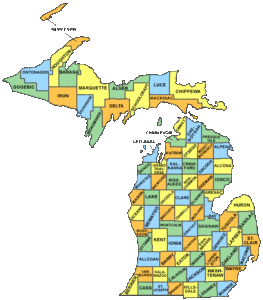 Michigan’s 83 county governments will be led by 619 elected county commissioners after the 2022 elections, following decisions this fall by the county apportionment boards. The Nov. 19 Legislative Update had incorrect figures for Oceana County, which changed the total.
Michigan’s 83 county governments will be led by 619 elected county commissioners after the 2022 elections, following decisions this fall by the county apportionment boards. The Nov. 19 Legislative Update had incorrect figures for Oceana County, which changed the total.
The new total is a decrease of 3 commissioners from the current roster of 622 commissioners established after the last census and apportionment process.
Eight counties increased the size of their boards for 2023. The biggest boost was 2 seats, done in 5 counties, including Kent County, which, at 21, will have the largest board in the state on Jan. 1, 2023.
Seven counties reduced the size of their boards, with the largest reduction in Antrim, which is going from 9 districts to 5. Oakland County, which currently has the state’s largest board at 21, reduced its board ranks to 19 for 2023. See full corrected list here.
Rules for open meetings revert to old form on Jan. 1
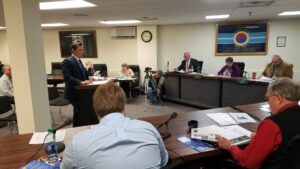 Public meetings in Michigan governed by the state’s Open Meetings Act (OMA) will revert to pre-COVID rules on Jan. 1, 2022. This means that commissioners cannot participate in a county board session as a voting member via electronic means, with only one narrow exception.
Public meetings in Michigan governed by the state’s Open Meetings Act (OMA) will revert to pre-COVID rules on Jan. 1, 2022. This means that commissioners cannot participate in a county board session as a voting member via electronic means, with only one narrow exception.
As detailed in a new memo from the law firm of Cohl, Stoker & Toskey, P.C., the permissive rules for remote participation granted under Public Act 254 of 2020 expire at the end of 2021. At that point, the only way a commissioner can participate remotely as a voting member is if the member must be physically absent due to military duty.
Boards, of course, can continue to livestream their public sessions. And commissioners who cannot be physically present can utilize remote means to listen to the meeting, but they cannot participate or vote as part of the board.
The memo reminds county boards to ensure their board rules, procedures and by-laws are modified to be consistent with the Open Meetings Act.
MDHHS expands Opioid Health Home services to additional counties
 The Michigan Department of Health and Human Services (MDHHS) has expanded the Opioid Health Home (OHH) initiative to more Michigan counties to provide intensive care management and care coordination services for Medicaid beneficiaries with an opioid use disorder (OUD), a move applauded by MAC this week.
The Michigan Department of Health and Human Services (MDHHS) has expanded the Opioid Health Home (OHH) initiative to more Michigan counties to provide intensive care management and care coordination services for Medicaid beneficiaries with an opioid use disorder (OUD), a move applauded by MAC this week.
“The U.S. Centers for Medicare & Medicaid Services (CMS) recently approved Michigan’s State Plan Amendment (SPA) to expand its Opioid Health Home initiative into PIHP Regions 6, 7 and 10. The expanded SPA will allow thousands of Medicaid beneficiaries meeting the eligibility criteria to receive OHH services,” MDHHS reported.
A Health Home is a benefit awarded to Medicaid beneficiaries who have a diagnosed with an Opioid Use Disorder and reside within one of the following Prepaid Inpatient Health Plan (PIHP) regions/counties:
- PIHP Region 1 (counties in the Upper Peninsula)
- PIHP Region 2 (21 northern-most counties of the Lower Peninsula)
- PIHP Region 4 (specifically Calhoun and Kalamazoo Counties)
- PIHP Region 6 (Lenawee, Livingston, Monroe, Washtenaw)
- PIHP Region 7 (Wayne)
- PIHP Region 9 (Macomb County)
- PIHP Region 10 (Genesee, Lapeer, Sanilac, St. Clair)
“Individuals who meet the criteria are able to work with a team of providers who will attend to a beneficiary’s complete health and social needs. Participation is voluntary and enrolled beneficiaries may opt out at any time.”
“MAC supports additional and expanded services of this program, which has been extremely successful in many counties so far,” said Governmental Affairs Associate Meghann Keit-Corrion.
For OHH-specific information, including eligibility and available resources, visit Michigan.gov/OHH.
 Staff picks
Staff picks
- State of Michigan highlights adoption process in Branch County (WTVB-AM)
- New Health Equity Project aims to significantly reduce health disparities for vulnerable residents in five Michigan counties (Center for Health and Research Transformation)
- Modernizing American infrastructure requires people and procurement, not just dollars (Brookings Institution)
- ACLU files federal lawsuit to ensure access to medication for opioid use disorder for people who are incarcerated (ACLU of Michigan)

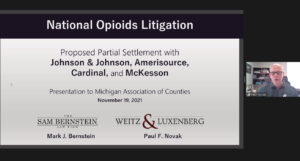 Attorneys involved with the national opioid settlements briefed MAC members Friday morning on the status of the settlement and how resulting payments to counties will be handled. MAC hosted the webinar, which included a Q&A session led by Governmental Affairs Associate Meghann Keit-Corrion.
Attorneys involved with the national opioid settlements briefed MAC members Friday morning on the status of the settlement and how resulting payments to counties will be handled. MAC hosted the webinar, which included a Q&A session led by Governmental Affairs Associate Meghann Keit-Corrion. MAC continues to urge elected county officials to speak out in favor of legislation to create four-year terms for county commissioners.
MAC continues to urge elected county officials to speak out in favor of legislation to create four-year terms for county commissioners.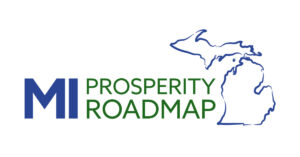 As the campaign for the
As the campaign for the 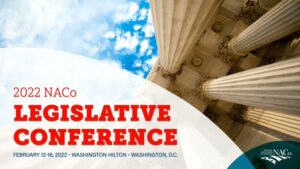 Conference
Conference MAC’s offices in Lansing will be closed Nov. 25-26 to observe the Thanksgiving holiday. Normal office hours resume on Monday, Nov. 29.
MAC’s offices in Lansing will be closed Nov. 25-26 to observe the Thanksgiving holiday. Normal office hours resume on Monday, Nov. 29. Michigan Green Communities, of which MAC is a member, is hosting a webinar on Nov. 30 at 11 a.m. to share updates coming to the MGC Challenge and Network. Participants will hear from the new MGC coordinator, Danielle Beard, about the updates and have time to ask questions about the program and what to expect. This webinar is specifically intended for staff and elected/appointed officials of counties, cities, villages, and townships – whether or not they have participated in Green Communities in the past.
Michigan Green Communities, of which MAC is a member, is hosting a webinar on Nov. 30 at 11 a.m. to share updates coming to the MGC Challenge and Network. Participants will hear from the new MGC coordinator, Danielle Beard, about the updates and have time to ask questions about the program and what to expect. This webinar is specifically intended for staff and elected/appointed officials of counties, cities, villages, and townships – whether or not they have participated in Green Communities in the past.
 A webinar on Tuesday, Nov. 30 will focus on local government issues involving pensions and retiree health care.
A webinar on Tuesday, Nov. 30 will focus on local government issues involving pensions and retiree health care. Federal legislation to provide $1.2 trillion over five years to make significant investments in transportation, water, power and energy, environmental remediation and broadband is now on President Biden’s desk after both chambers of Congress gave bipartisan approval.
Federal legislation to provide $1.2 trillion over five years to make significant investments in transportation, water, power and energy, environmental remediation and broadband is now on President Biden’s desk after both chambers of Congress gave bipartisan approval. Secure funding for Michigan’s 9-1-1 infrastructure moved closer to reality this week as the Senate Energy and Technology Committee passed legislation to extend the state 9-1-1 enabling act until December 2027.
Secure funding for Michigan’s 9-1-1 infrastructure moved closer to reality this week as the Senate Energy and Technology Committee passed legislation to extend the state 9-1-1 enabling act until December 2027.
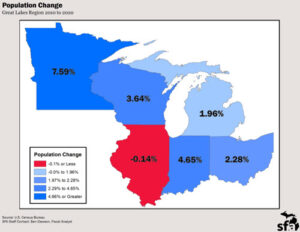 Staff picks
Staff picks
 In response to questions from members, MAC reached out to the firm of Cohl Stoker & Toskey for information regarding how the federal vaccine mandate on employers relates to county governments.
In response to questions from members, MAC reached out to the firm of Cohl Stoker & Toskey for information regarding how the federal vaccine mandate on employers relates to county governments. MAC continues to urge county leaders to voice their opposition to bills that would create a damaging privatization scheme for the state’s local mental health services.
MAC continues to urge county leaders to voice their opposition to bills that would create a damaging privatization scheme for the state’s local mental health services.
 Approvals by voters in Emmet and Manistee County for funds for their local medical care facilities were among the highlights of county-related millage elections on Nov. 2.
Approvals by voters in Emmet and Manistee County for funds for their local medical care facilities were among the highlights of county-related millage elections on Nov. 2.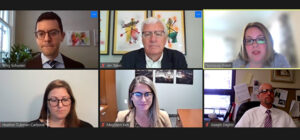
 MAC offices to observe holiday on Nov. 11
MAC offices to observe holiday on Nov. 11 In response to an “unprecedented” increase of $16.5 million in the state budget for the
In response to an “unprecedented” increase of $16.5 million in the state budget for the 




